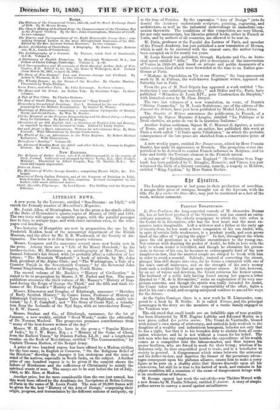PARISIAN TIfEATRICALS.
Le Pere Prodigue, the long-expected comedy of M. Alexandre Dumae
Lila, has at last been produced at the Gymnase, and has caused an extra- ordinary sensation. The elderly scapegrace to which the title refers is
the Count de la Rivonniere, who has the best heart and the most ex- pensive tastes imaginable. Left a widower and a father at the early age of twenty-four, he has made a boon companion of his son Andre, who,
in spite of certain little weaknesses, is a prudent youth, and soon grows tired of the office of "paying the piper." In fact, throughout the whole piece the old gentleman is a terrible encumbrance to the young one.
Not content with draining the pocket of Andre' he falls in love with the lady to whom Andre is betr6thed, and though he abandons his preten- sions in favour of his son, he becomes so extravagantly fond of his new
daughter-in-law, that the married couple are obliged to break with him in order to avoid a scandal. Solitude, instead of correcting the sinner, plunges him still deeper into vice, for he forms a connexion with one of his son's cast-off mistresses, and on the strength of his son's money leads such a reckless life that an open rupture ensues. At last, however, by an act of valour and devotion, the Count retrieves his former errors.
The husband of a noble lady having found among her papers a letter directed to "M. de la Rivonmere," seeks an explanation of its very sus- picions contents, and though the epistle was really intended for Andre, the Count takes upon himself the responsibility of the affair, fights a duel in his son's stead, and escaping uninjured resolves to amend his ways for the future.
At the Opera Comique there is a new work by M. Limnander, com- posed to a book by M. Scribe. It is called Yvonne' and the principal personages in the story are the members of a rustic family engaged in the Vendean war.
The old creed that small hands are an infallible sign of true gentility has been illustrated by MM. Eugene Labiche and Fsdouard Martin in a new piece, called Its petites mains. The Count de Vautinelle, blessed
with nature's own stamp of aristocracy, and united in holy wedlock to the daughter of a wealthy and industrious bourgeois, believes not only that he has a right, but that it is his bounden duty to abstain from all occu- pation whatever, and he is not without a reason for his belief. The rich man who has any employment besides the expenditure of his wealth comes as a competitor into the labour-market, and thus injures his poorer brethren, who are forced to work for their living ; whereas if he disburses only, he does unqualified good to trade, and is a benefactor to society in general. A disagreement which arises between the aristocrat
and his father-in-law, and deprives the former of the pecuniary advan- tages consequent upon his plebeian alliance causes him to make a sorry figure as he puts on a shabby attire that throws discredit upon all his connexions, but still he is true to his hatred of work, and remains in his abject condition till a cessation of the cause of disagreement brings with it an amelioration of fortune.
M. Bocage opened last week the out-of-the-way Theitre Marcel with a new drama by M. Paulin Niboyet, entitled L'Amour. A story of simple pathos serves to convey a moral against mesalliances.


























 Previous page
Previous page